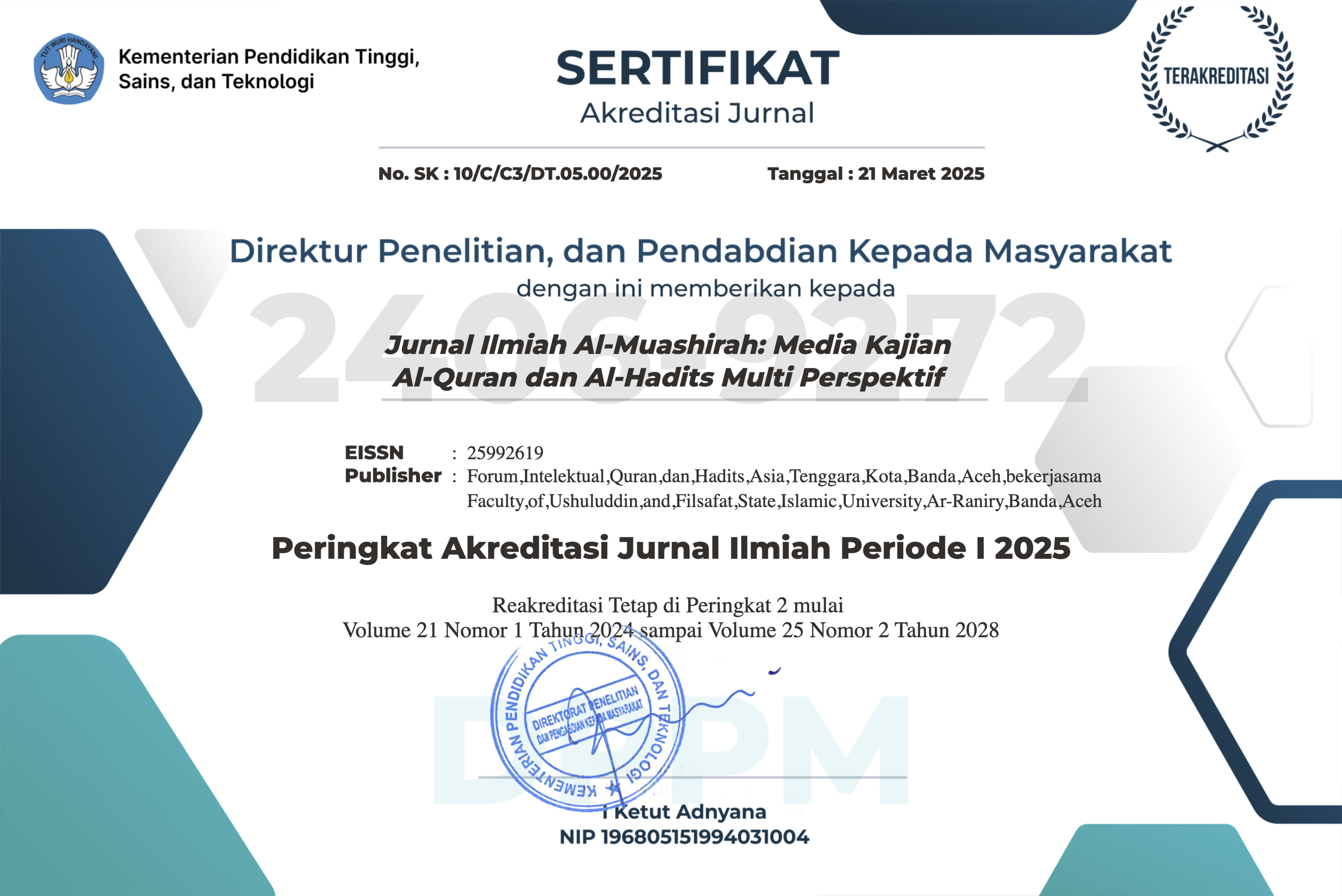Bahaya Riba dalam Perspektif Hadis
DOI:
https://doi.org/10.22373/jim.v17i2.9047Keywords:
Riba, Hadits Nabi, Ketidakadilan, Dosa, Kecemburuan SosialAbstract
This article aims to discuss the purpose of riba (usury) prohibition within The Prophet Tradition perspective. As it is known undoubtfully, the terminology of riba (usury) is forbidden not only in Islam as a religion but also in Jew as well as Christian. In Al-Qur’an itself, the prohibition of riba has gradually been prohibited, at least through four passages that are found in four disparate surahs in which riba (usury) at last is forbidden and condemned; even it is also considered as a great sin. By using bibliography studies, this article would like to dig and elaborate on some of the Prophet hadith regarding the prohibition of riba and its impact within society. It is believed that riba is a great sin in Islam because it leads to social jealousy and injustice. Therefore the tradition of riba is aiming at promoting gracious, wisdom, a mutual benefit that can realize a more just economic system that is based on Islamic ethics to perform justice and prosperity.
Abstrak
Artikel ini ingin membahas tujuan dari pelarangan riba dalam perspektif hadis. Tidak diragukan lagi, istilah riba sebenarnya dilarang dalam semua agama samawi, baik Yahudi, Kristen maupun Islam. Di dalam Al-Qur'an sendiri, pelarangan riba memiliki empat ayat yang ditemukan pada empat surat berbeda, di mana riba jelas-jelas dikutuk dan dilarang, bahkan riba dinyatakan pula sebagai dosa yang sangat serius. Dengan menggunakan studi literatur, artikel ini ingin menggali dan mendalami beberapa hadis tentang larangan riba dan dampaknya di masyarakat. Dikatakan bahwa riba adalah dosa dalam Islam, karena mengarah pada kehancuran, sedangkan sedekah mengarah kepada pertumbuhan. Oleh karena itu, penghapusan riba sebenarnya bertujuan untuk memajukan sistem ekonomi yang merahmati, lebih berkeadilan, hubungan sosial yang lebih berimbang serta nilai-nilai etika yang sejalan dengan ajaran Islam.
Downloads
References
Al-Bukhari, Abdillah Muhammad bin Isma'il. Shahih al-Bukhari. Beirut: Dar Ihya' al-Turath al-'Arabiy,
Al-Kasani. Badaa’i al-Shanaa’i fi Tartiib al-Syaraa’i. Beirut: Daar el-Kitab el-‘Arabiy, t.t., 5/184
Al-Ramli. Nihayatul Muhtaaj. Kairo: Maktabah wa Mathba’ah al-Bab al-Halabiy, t.t, 3/409
Attaqi, Uqinu. 2005. “Riba Menurut Fikih Islam”, Tim PAKEIS (ed.), Produk-produk Investasi Bank Islam Teori dan Praktek, Cairo: PAKEIS ICMI Orsat Cairo
Ibnu Mandzur. 1990. Lisaan al-‘Arab, Beyrut: Daar el-Shaadir
Muslim bin al-Hajjaj, Abu al-Husain. Shahih Muslim. Beirut: Dar Ihya' al-Turath al-'Arabiy, t.t.
Syafi’i Antonio, Muhammad. 2001. Bank Syariah: Dari Teori ke Praktik. Jakarta: Gema Insani Press
Downloads
Published
Issue
Section
License
Authors who publish in Jurnal Ilmiah Al-Mu'ashirah agree to the following terms:
- Authors retain copyright and grant the journal right of first publication with the work simultaneously licensed under a Attribution-ShareAlike 4.0 International (CC BY-SA 4.0) License that allows others to share the work with an acknowledgment of the work's authorship and initial publication in this journal.
- Authors are able to enter into separate, additional contractual arrangements for the non-exclusive distribution of the journal's published version of the work (e.g., post it to an institutional repository or publish it in a book), with an acknowledgment of its initial publication in this journal.
- Authors are permitted and encouraged to post their work online (e.g., in institutional repositories or on their website) prior to and during the submission process, as it can lead to productive exchanges, as well as earlier and greater citation of published work (See The Effect of Open Access).













